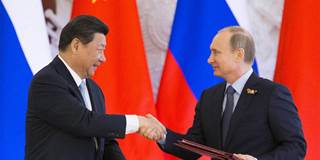A unique conjuncture of economic and political developments has created an opportunity for Eurasia to emerge from its historical slumbers, with Russia and China leading the way. But whether their marriage of convenience will lead to an enduring union, or Russia’s subordination to China, remains to be seen.
LONDON – The Chinese are the most historically minded of peoples. In his conquest of power, Mao Zedong used military tactics derived from Sun Tzu, who lived around 500 BC; Confucianism, dating from around the same time, remains at the heart of China’s social thinking, despite Mao’s ruthless attempts to suppress it.
So when President Xi Jinping launched his “New Silk Road” initiative in 2013, no one should have been surprised by the historical reference. “More than two millennia ago,” explains China’s National Development and Reform Commission, “the diligent and courageous people of Eurasia explored and opened up several routes of trade and cultural exchanges that linked the major civilisations of Asia, Europe, and Africa, collectively called the Silk Road by later generations.” In China, old history is often called to aid new doctrine.
The new doctrine is “multipolarity” – the idea that the world is (or should be) made up of several distinctive poles of attraction. The contrast is with a “unipolar” (that is, an American- or Western-dominated) world.

LONDON – The Chinese are the most historically minded of peoples. In his conquest of power, Mao Zedong used military tactics derived from Sun Tzu, who lived around 500 BC; Confucianism, dating from around the same time, remains at the heart of China’s social thinking, despite Mao’s ruthless attempts to suppress it.
So when President Xi Jinping launched his “New Silk Road” initiative in 2013, no one should have been surprised by the historical reference. “More than two millennia ago,” explains China’s National Development and Reform Commission, “the diligent and courageous people of Eurasia explored and opened up several routes of trade and cultural exchanges that linked the major civilisations of Asia, Europe, and Africa, collectively called the Silk Road by later generations.” In China, old history is often called to aid new doctrine.
The new doctrine is “multipolarity” – the idea that the world is (or should be) made up of several distinctive poles of attraction. The contrast is with a “unipolar” (that is, an American- or Western-dominated) world.